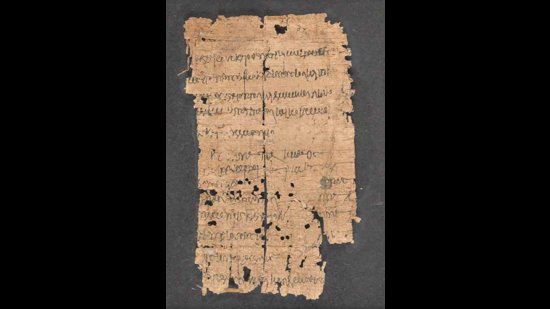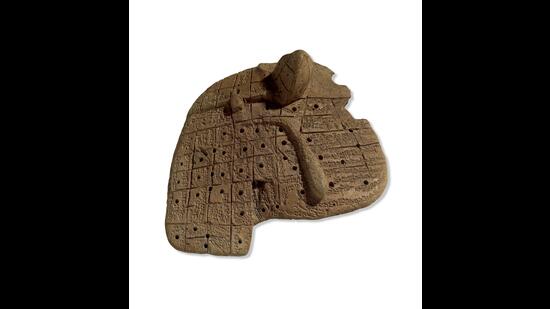Leaps of fate: See how people of the past attempted to predict the future
Spiders, parchment, bone and complex math were among the methods ancient cultures used. What drives this need? Who are the soothsayers in our midst today?
Risk analysts, it would appear, have always been around. They’ve just gone by different names: oracles, divination experts, shamans.

An exhibition currently underway at Oxford University’s Bodleian Library offers a riveting look at how people of the past sought to predict their future. The questions most commonly asked to oracles and divination experts are startlingly familiar: “Did my partner cheat on me?”, “Will my mother’s health improve?”, “Are there better days coming?”
Oracles, Omens and Answers, which opened in December and concludes on April 27, has been curated by Michelle Pfeffer, a historian of science and religion, and David Zeitlyn, an anthropologist, both at Oxford University. It explores ancient prediction and forecasting methods such as extispicy (the examining of animal entrails; a practice that dates to 3000 BCE Mesopotamia), the Ancient Greek oracles surviving as revered papyrus parchments (dating to about the 1st century BCE), and spider divination (still practised in Cameroon, with yes-or-no questions posed to spiders and crabs).
It wasn’t just the desperate or lovelorn who sought out this supernatural assistance.
In a book compiled as a companion read to the exhibition, titled Divination, Oracles & Omens, the two researchers explore how most cultures around the world evolved the need for such a service.

“For many centuries, the role of today’s epidemiologists, meteorologists and even economists were undertaken by astrologers across Europe, for instance,” Pfeffer says. They were hired by universities and royal courts to make predictions about upcoming risks — plagues and famines, wars and riots, floods and droughts — helping those responsible for large groups of people make important decisions and plan ahead.
“They didn’t always get it right. “In fact, they very often got things wrong,” Pfeffer says. “But much the same could be said of today’s scientific forecasters, whose predictions are not immune to criticism.”
Diviners have held important roles in royal courts and governments. Their advice could alter battleplans and shape how rulers responded to political, economic, meteorological or health crises. “Diviners may have often changed the direction of history,” Pfeffer says.
She isn’t only talking about the dim, distant past.
In the 1980s, for instance, Joan Quigley served as astrologer to US President and First Lady Ronald and Nancy Reagan during his two terms in office. Quigley went on to write a book about her stint at the White House, called What Does Joan Say? (1990).
A highlight of the exhibit at Oxford is a 2000 BCE oracle bone from Shang-era China. One of the oldest artefacts on display, it is on loan from the Pitt Rivers Museum in Oxford.
In this form of divination, a question was inscribed on the bone — in this case, an ox scapula — which was then cracked with a heated bar. The pattern of cracks was said to guide interpreters to the right answer.
The newest artefacts in the exhibition are from the same region: almanacs for the year 2024, from Hong Kong. These special calendars mark auspicious days for planning a wedding, moving house, starting a new business or honouring one’s ancestors.
Ask force

What’s especially interesting, Zeitlyn says, is that people can find divination useful even when they don’t believe in the underlying theory or cosmology behind a practice. “Divination consultations can provoke reflection and deep thought, help one identify an instinctive reaction to a series of alternative choices, and encourage you to stop dithering and simply decide!” he adds.
Towards this end, palms, and hands have been read for centuries, in Europe, China and India, with minimal contact between the systems. There has been a similar broad diffusion of ideas relating to the 12 constellations (traceable as far back as Ancient Babylon, c. 500 BCE).
The notation systems of the Yoruba people of West Africa and the Chinese Yijing evolved along the same lines, but entirely separately: both use large, structured bodies of verse and mathematical formulae to make predictions.
The parallels between certain divinatory practices and algorithms raise some interesting issues too, Zeitlyn adds. When a diviner made a pronouncement, for instance, it didn’t automatically follow that the client would adhere to it. It was common practice to “see more like it” and get a second or third opinion.

“Sometimes, the advice simply helped crystalise things, and helped the person realise what they really wanted to do. We think AI and algorithms can play a similar role today,” Zeitlyn says.
Perhaps their most vital insight, the curators say, is that people have always needed a little otherworldly help when it comes to major turning points and big decisions. It’s a habit we hold on to. As visitors left the exhibition, Zeitlyn and Pfeffer asked what questions they would put to Mambila spiders.
“Will my team win today” and “Will I get my degree” apparently topped the list.








